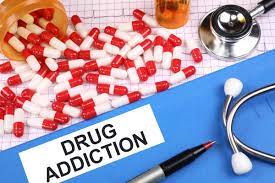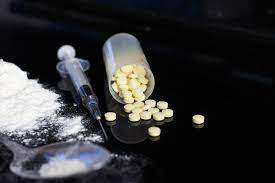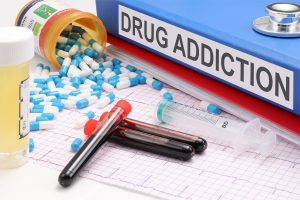Can Hgh Reverse The Damage Of Drug Addiction?
Can Human Growth Hormone Treat Brain Damaged Addicts?
There have been several studies in recent years that have provided evidence that Human Growth Hormone may produce beneficial effects in patients that are suffering from neurodegenerative diseases, but a recent study shows that HGH Injections may have the ability to alleviate neurological issues resulting from drug use.
In this case, the study strongly suggests that Therapeutic Human Growth Hormone may have the ability to alleviate attention deficit and memory issues related to heroin abuse.
There is a large body of evidence that the abuse of opiates such as morphine, methadone, and heroin damage the cells of the brain, and the two areas most profoundly impacted are the areas that control memory and attention.
This new research provides convincing evidence that HGH Shots have at least some restorative effects on these two aspects of neurological function.
How Do Heroin and Other Opiates Harm the Body?
Heroin and Opiate Abuse can harm the body and the brain in several ways. Opiates, especially heroin, carry a high risk of overdose and can spread some diseases through shared needles, such as HIV and Hepatitis.
People that regularly abuse opiates can experience several health conditions, including kidney and liver disease, constipation, abscesses, heart infections, and collapsed veins. They are also at enhanced risk of pneumonia, resulting from a compromised immune system and depressed breathing.
Heroin and other opiates on the black market also contain harmful additives that can damage and clog the arteries and blood vessels, potentially damaging many organs, including the lungs and the brain.
How Does the Body Process Heroin?
Heroin produces its physiological effects because when it is injected or snorted, it is circulated through the bloodstream to the brain, broken down into morphine, stimulating opioid receptors in the brain and throughout the body.
There are also opioid receptors in the base of the brain, which is why the drug and related drugs can cause overdose and death. Heroin depresses respiration, arousal, and blood pressure, which can lead directly to cardiac arrest.
How Do Heroin and Opiates Cause Brain Damage?
Two primary ways that Heroin causes brain damage are oxygen deprivation and the influence of toxic additives. Heroin seems to impact memory and attention span by rewiring the brain in response to addiction.
The addictive capacity of Heroin and other Opioids is so strong that even after the feelings of addiction subside somewhat, the neurological effects of addiction still leave the brain wired in a way that negatively impacts psychological function.
How Can HGH Injections Protect the Brain from Brain Damage Associated with Opiate Addiction?
A Swedish study from Uppsala University explains that cells associated with attention and memory are among the first to break down when the brain is taxed by long-term opiate use. They also suggest that Bio-Identical Human Growth Hormone Injections may have the ability to salvage these damaged cells, alleviating the negative impact of Opiate and Opiate Overdose on the brain.
How Does the Body Make HGH and What Does it Do?
Human Growth Hormone is produced naturally by the pituitary gland by small organs known as Somatotrophs. HGH is mainly responsible for cell replication and cell growth throughout the lifespan. During childhood and adolescence, HGH Levels in the body are high, contributing to heightened physiological growth and development.
Later in life, HGH is secreted in lower concentrations to maintain health and optimal hormone balance, and there is growing evidence that HGH Injections can be beneficial in several disorders and physiological issues, which can be treated by encouraging enhanced cellular reproduction in target areas, such as the brain or the joints.
In the case of joint injuries, Human Growth Hormone encourages cartilage in the joints to develop more smoothly.
There is also evidence that Human Growth Hormone Injections can enhance rehabilitation and recovery times associated with injury and illness.
HGH Treatments Appear to Protect Brain from Damage Associated with Opiate Dependency
The researchers related to this study explain that this presents a potentially groundbreaking new way to treat patients suffering from the effects of Opiate Addiction and may be a way to prevent brain damage in these patients and even increase psychological function through HGH Injections.
This can also be used to protect the brains of patients that are taking Opioids for pain management to reduce the risk of psychological side effects and neurological deterioration.
HGH, Opiates, and Neurogenesis
Earlier studies provide strong evidence that long-term Opiate Use and Addiction prevent the brain from staying healthy because it slows down  neurogenesis or the development of new cells in the brain. Opiate Use primarily slows down neurogenesis in the area of the brain known as the Hippocampus.
neurogenesis or the development of new cells in the brain. Opiate Use primarily slows down neurogenesis in the area of the brain known as the Hippocampus.
This area of the brain is located in the cerebellum, and the area is strongly related to what is known as episodic memory. Episodic memory is responsible for linking people, places, and emotions to particular memories, essentially maintaining them for long-term storage.
HGH Deficiency is Also Associated with Cognitive Decline
Human Growth Hormone and other related hormones sustain neurogenesis, and HGH Decline is associated with a loss of cognitive ability as the brain can no longer create new cells and connections at the rate at which old cells and connections deteriorate.
In essence, Opiate Dependence slows down the rate at which cells regenerate, causing the patient to retain memory and attention like someone many years older.
Previous Studies Show that HGH Provides Cognitive Benefits
The co-author of this neurological HGH Study, Fred Nyberg, explains that older patients treated with Bio-Identical HGH in previous studies experienced enhanced cognitive function and that they hypothesized that Opiate Dependent patients would experience the same quantifiable benefit.
Opiates and Human Growth Hormone appear to have opposite impacts on the brain.
Opiates limit the brain's ability to restore itself, even after the patient has stopped using the drugs. Human Growth Hormone Injections appear to counteract that negative neurological impact, allowing people currently taking Opiates for clinical reasons to avoid the related neurological decline and perhaps restoring neurological function to individuals that are recovering from a previous addiction.
In Vitro, Lab Testing Proves that HGH Protects the Brain from Morphine
The researchers demonstrated the possible effectiveness of this form of treatment through in vitro testing. They used partially developed nerve cells drawn from the fetus of a mouse and isolated them in a petri dish.
To mimic the effects of opiate addiction on nerve cells, they dipped the cells into a bath of pure morphine for seven days. Control neurons were simply dipped in morphine, but experimental cells were also treated with Bio-Identical Human Growth Hormone.
In the end, they found that the neurons in the control sample started to die from morphine exposure, but those in the culture with Human Growth Hormone added were able to survive despite the morphine. In some instances, the number of neurons actually increased among cultures in the experimental group!
Nyberg is optimistic, explaining that if Human Growth Hormone Injections have a similar effect on neurons in the brain as they do on brain cells in the petri dish, the hormone may end up being an effective medical treatment to preserve the mental faculties of both ex-opiate addicts and those suffering from chronic pain which only responds to morphine and similar drugs.
Pilot Studies Have Begun in the Treatment of an Opiate Dependent Patient
Since the original study was published, Nyberg and his associates have begun experimental HGH Injection Therapy on a single pilot patient. This patient takes opiates for chronic pain and suffers from memory issues directly resulting from Opiate Treatment.
Although this pilot study is ongoing, Nyberg explains that the results achieved thus far are promising. The pilot patient has been taking HGH Injections with no significant side effects and is experiencing a quantifiable increase in cognitive memory ability.
The results are so promising that Nyberg is already preparing to take HGH for Opiate Addiction to a clinical trial to assess the treatment's potential more thoroughly. All signs thus far suggest that Growth Hormone Therapy will effectively safeguard the Hippocampus from the neuro-degenerative effects of powerful opiates.
thoroughly. All signs thus far suggest that Growth Hormone Therapy will effectively safeguard the Hippocampus from the neuro-degenerative effects of powerful opiates.
HGH Injections Could Possibly Alleviate Neurological Dependency Associated with Drug Addiction
A representative of the National Institute on Drug Abuse, Frank Vocci, is interested in the potential to use Bio-Identical Human Growth Hormone as a treatment for drug addiction.
There have been legitimate arguments made that the benefits to cognitive function produced by Human Growth Hormone could potentially have the ability to make it easier for current addicts to quit addictive drugs and that it may help those that are already clean stay clean.
Research regarding the potential of Human Growth Hormone to combat addiction is still in a purely hypothetical stage. There is no hard evidence supporting the use of HGH Injections for Addiction Recovery.
- 0001 What Is The Difference Between Health And Wellness? [Last Updated On: January 18th, 2025] [Originally Added On: November 26th, 2020]
- 0002 What Is Human Growth Hormone [Last Updated On: January 18th, 2025] [Originally Added On: November 27th, 2020]
- 0003 Types Of Psoriasis Treatment [Last Updated On: January 17th, 2025] [Originally Added On: November 28th, 2020]
- 0004 The Effects Of Elevated Homocysteine Levels On Health And Well Being [Last Updated On: January 16th, 2025] [Originally Added On: November 29th, 2020]
- 0005 Are Hgh Anti-aging Claims Legitimate? [Last Updated On: January 15th, 2025] [Originally Added On: November 30th, 2020]
- 0006 Popular Herbicide Atrazine A Major American Health Risk [Last Updated On: January 16th, 2025] [Originally Added On: December 1st, 2020]
- 0007 The Influence Of Patent Law On Generic And Patented Medications [Last Updated On: January 15th, 2025] [Originally Added On: December 2nd, 2020]
- 0008 How Does Hgh Keep You Young? [Last Updated On: January 14th, 2025] [Originally Added On: December 4th, 2020]
- 0009 Hgh Honesty A Hallmark Of Indians Pitcher Byrds First Book [Last Updated On: January 14th, 2025] [Originally Added On: December 5th, 2020]
- 0010 How Does Growth Hormone Deficiency Testing Work? [Last Updated On: January 13th, 2025] [Originally Added On: December 6th, 2020]
- 0011 Hgh Benefits [Last Updated On: January 12th, 2025] [Originally Added On: December 7th, 2020]
- 0012 Four Best Ways To Boost Hgh Levels [Last Updated On: February 17th, 2025] [Originally Added On: December 8th, 2020]
- 0013 Can Laughter Boost Hgh Production? [Last Updated On: February 19th, 2025] [Originally Added On: December 9th, 2020]
- 0014 Bio-identical Hgh And Testosterone For Andropause [Last Updated On: December 2nd, 2025] [Originally Added On: December 11th, 2020]
- 0015 Lifting Weights Increases Growth Hormone and Testosterone! [Last Updated On: February 16th, 2025] [Originally Added On: June 26th, 2021]
- 0016 How Can I Check Out the Credentials of a Physician Before Getting HRT? [Last Updated On: March 8th, 2025] [Originally Added On: February 1st, 2023]
- 0017 What is the Age Profile of Adult-Onset HGH Sufferers? [Last Updated On: May 1st, 2025] [Originally Added On: June 4th, 2023]
- 0018 Introduction: Importance of Checking a Physician's Credentials [Last Updated On: March 4th, 2025] [Originally Added On: March 4th, 2025]
Word Count: 1467






